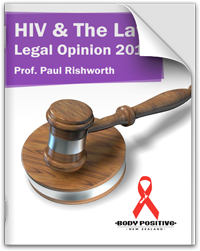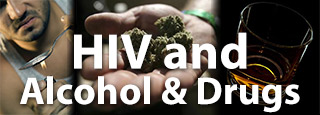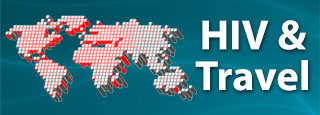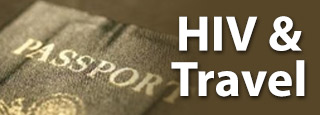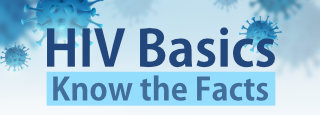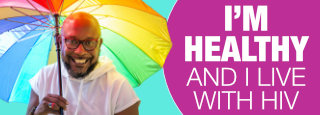HIV & Disclosure
A person’s HIV status is private. It's your right to choose whether to tell someone (or ‘disclose’) that you have HIV. However, there are some situations where you are legally required to share your status.
This guide explains what those situations are so that you can have a greater understanding of what to expect and your rights and responsibilities.
Quicklinks:
Do i have to disclose?
The thought of telling a sexual partner may make you feel anxious, but there could be advantages to being open about your HIV status with them.
People living with HIV are entitled to an active, healthy sex life. You do not have to tell a sexual partner that you have HIV, as long as you take appropriate precautions to prevent sexually transmitting HIV.
In New Zealand, what is considered 'appropriate precautions' is using a condom for vaginal or anal sex. While adhering to treatment so you maintain an undetectable viral load offers more protection than condom use, undetectable has yet to be recognised under the NZ law.
Therefore you DO NOT have a legal duty to disclose your HIV status before having vaginal or anal sex if you use a condom, however if you do not intend to use a condom, you DO have a legal duty to disclose your HIV status before having vaginal or anal sex without a condom (regardless of your viral load).
In New Zealand, what is considered 'appropriate precautions' is using a condom for vaginal or anal sex. While adhering to treatment so you maintain an undetectable viral load offers more protection than condom use, undetectable has yet to be recognised under the NZ law.
Therefore you DO NOT have a legal duty to disclose your HIV status before having vaginal or anal sex if you use a condom, however if you do not intend to use a condom, you DO have a legal duty to disclose your HIV status before having vaginal or anal sex without a condom (regardless of your viral load).
If you don’t take precautions and don’t disclose, then you could potentially be charged with a criminal offence, even if no transmission of HIV takes place.

What about at work?
In most cases, it is completely your choice whether or not to tell your employer you have HIV. Many people don’t because they don’t think it’s relevant to their job.
Under the Human Rights Act 1993, in New Zealand it is illegal to discriminate against anyone living with HIV. This means that you are protected from discrimination at all stages of the employment process, including recruitment. If an employer rejects a job applicant because they are living with HIV, it is direct discrimination and is unlawful.
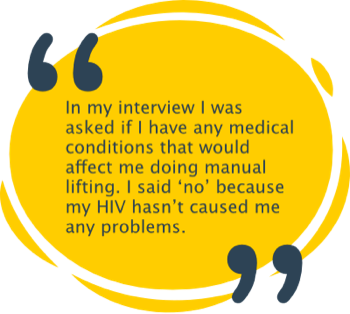
It is unlawful for an employer to ask you about your health or disability before they’ve offered you a job. This also means they can’t refer you to an occupational health practitioner until a job offer is made. However, questions about health and disability can be asked in a few specific circumstances during the initial stages of recruitment, e.g. you could be asked about your ability to carry out a task which is required for the job, such as lifting heavy objects.
Many people will feel that HIV has made no difference to their health at all, whereas others may at times be unable to carry out certain tasks.
However, to turn someone down just because they have HIV (when it has no relevance to their ability to do a job) would be discriminatory, and you could take the employer to a tribunal.
Once an employer has made a job offer they may ask questions relating to health or disability. Except in very limited circumstances there is no reason why an HIV test should be included in any medical questionnaire/examination. However a 'risk assessment' can be made by an employer in certain jobs where there is a high potential risk. If you are asked to disclose your HIV status on a medical questionnaire after a job offer, you can ask before completing the questionnaire what the information will be used for, who will have access to it and why specific questions are necessary for the role. The onus of the risk and necessity of the testing/restrictions must be proven by the employer.
However, to turn someone down just because they have HIV (when it has no relevance to their ability to do a job) would be discriminatory, and you could take the employer to a tribunal.
Once an employer has made a job offer they may ask questions relating to health or disability. Except in very limited circumstances there is no reason why an HIV test should be included in any medical questionnaire/examination. However a 'risk assessment' can be made by an employer in certain jobs where there is a high potential risk. If you are asked to disclose your HIV status on a medical questionnaire after a job offer, you can ask before completing the questionnaire what the information will be used for, who will have access to it and why specific questions are necessary for the role. The onus of the risk and necessity of the testing/restrictions must be proven by the employer.
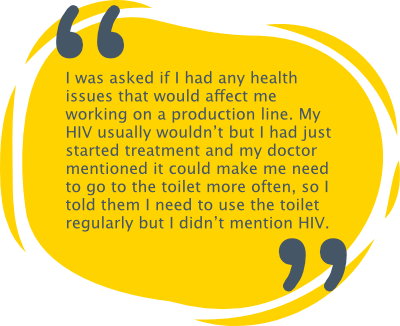
Managing HIV at work?
Employers cannot dismiss or treat a person unfairly because they have HIV, or need a short time off work because of symptoms or the side effects of treatment.
Although you are under no obligation, there can be advantages to disclosing your HIV status at work, particularly if you want to request reasonable adjustments to help you do your job. Reasonable adjustments could include things like time off for hospital appointments, flexible working hours to fit in with any side effects of treatment, or privacy to take medication. If you do disclose, your employer must keep this information confidential and the people you work with do not need to know what your condition is.
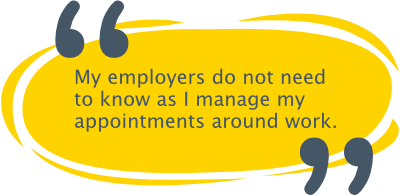
Seeking redress
If you think an employer has discriminated against you, you can contact the Human Rights Commission (HRC) or local Citizens Advice Bureau. If you belong to a union, your union representative can also support you. If necessary you can make a discrimination claim to the Employment Relations Authority (ERA).
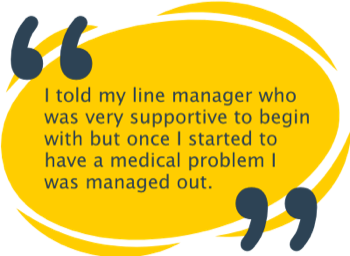
Jobs where there may be a requirement to disclose
• Healthcare Workers
Healthcare Workers
The professional regulatory bodies for some health care workers may require that members of that profession disclose their HIV status in certain circumstances where there is a risk of HIV exposure when performing ‘exposure-prone procedures’.
Exposure-prone procedures are those where a worker’s blood could come into contact with a patient’s open tissues. This includes surgery, midwifery and dentistry, where a worker’s gloved hands may be in contact with sharp instruments, needle tips or sharp pieces of bone or teeth.
Exposure-prone procedures are those where a worker’s blood could come into contact with a patient’s open tissues. This includes surgery, midwifery and dentistry, where a worker’s gloved hands may be in contact with sharp instruments, needle tips or sharp pieces of bone or teeth.
• Military Personnel
Military Personnel
The Army, Navy and Air Force do not accept applications from people who are HIV-positive. This is the same for many health conditions such as diabetes. The military’s policy is that although you cannot join the military with HIV, if someone is diagnosed after they have joined they are able to remain in service. Guidance will be given from a military occupational viewpoint about the most suitable placements and roles within the military, with responsibilities usually transferred from in-field to non field related posts.
• Aviation Workers
Aviation Workers
There are restrictions for HIV-positive pilots and air traffic control officers. These restrictions are intended to ensure that illness/medication does not affect work capability or judgment, and vary depending on whether a person shows symptoms related to HIV or medication. Civil Aviation Authority guidelines detail the various assessments that are required of pilots and air traffic control officers who are living with HIV, and the types of restrictions that might be put in place.
Receiving Healthcare
There is no legal requirement for you to disclose your HIV status before undergoing any type of medical examination or treatment.
All healthcare professionals use ‘universal precautions’ to prevent the transmission of blood-borne viruses like HIV to and from patients. However, telling healthcare workers about your status could help them to provide you with better care.
Disclosure to healthcare workers can be particularly important as HIV medications can interact with other types of medication, and other conditions may be affected by HIV. If you have any doubts, you can ask your regular HIV specialist whether disclosure to other health practitioners could be beneficial.
If you disclose your HIV status to a medical practitioner, then this information, like other medical information, is protected by privacy laws. If you do not want other healthcare providers, such as your GP, to know your status, be sure to make this clear to your HIV specialist.
Disclosure to healthcare workers can be particularly important as HIV medications can interact with other types of medication, and other conditions may be affected by HIV. If you have any doubts, you can ask your regular HIV specialist whether disclosure to other health practitioners could be beneficial.
If you disclose your HIV status to a medical practitioner, then this information, like other medical information, is protected by privacy laws. If you do not want other healthcare providers, such as your GP, to know your status, be sure to make this clear to your HIV specialist.
We are all entitled to fair and respectful treatment when accessing healthcare and it is illegal to treat someone less favourably because they have HIV.
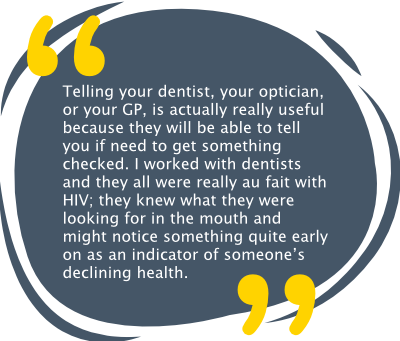
Getting Insurance
When taking out insurance, you have a legal obligation to disclose all relevant information and answer any questions as honestly as possible. Whether your HIV positive status is considered ‘relevant’ depends on the type of insurance you are applying for.
HIV status is unlikely to be relevant for home and contents insurance or car insurance. On the other hand, it will be relevant if you are taking out insurance cover on yourself. On all applications for life assurance, critical illness cover and income protection insurance, you will be asked if you have tested positive for HIV or are awaiting the results of a test. If the answer is yes, you must say so. If you don’t disclose when taking out these kinds of insurance policies, then the insurance company won’t have to pay out for any claim you make.
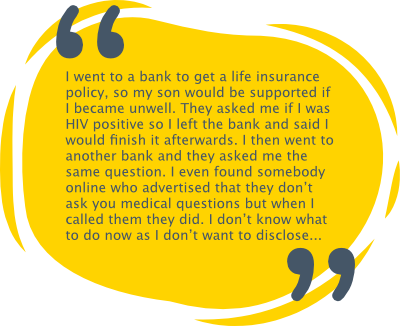
While Health Insurance is available to people living with HIV in some other countries around the world, we are not aware of any insurance company in New Zealand that offers Health Insurance to people living with HIV as a pre-existing condition unfortunately. Hopefully this will change in the future.
Life Assurance is available to people living with HIV but you will have to disclose your status to be covered. Insurers will consider factors such as your CD4 count, viral load and time on medication. The criteria can vary between insurers so it’s important to speak to a professional. The policies available are likely to be restricted to term assurance policies – this means you would be covered for a fixed period of time such as 10 or 25 years rather than whole of life assurance policies.
You can also contact insurance companies anonymously to ask them questions about disclosure in advance.
Life Assurance is available to people living with HIV but you will have to disclose your status to be covered. Insurers will consider factors such as your CD4 count, viral load and time on medication. The criteria can vary between insurers so it’s important to speak to a professional. The policies available are likely to be restricted to term assurance policies – this means you would be covered for a fixed period of time such as 10 or 25 years rather than whole of life assurance policies.
You can also contact insurance companies anonymously to ask them questions about disclosure in advance.
You should always make sure you read and understand the small print on insurance agreements prior to disclosing or entering into a contract.
You may also be asked about your HIV status when you take out travel insurance. Policies that cover medical expenses usually exclude claims arising from pre-existing conditions, and some companies may refuse to provide travel insurance at all. Our HIV & Travel section has information on companies that can provide travel insurance as well as general information about traveling overseas if you are living with HIV.
Is there a right way to disclose?
Deciding whether or not to tell someone you have HIV can be a difficult decision. Often those closest to you are the most difficult to tell.
Many people fear the impact that disclosing will have on their relationships with partners, friends, family and colleagues. However, telling people you have HIV can also be a rewarding experience: the burden of keeping a secret can be lifted, people can be brought closer together, and better support can be offered.
There is no right or wrong way to tell someone that you have HIV, and no set of rules that should always be followed. How you wish to disclose is personal to you. Remember, you have control over who you tell, and when and how you tell them. You may decide you don’t want to tell anyone at all. Consider your own needs first and say only what feels comfortable. Below are some points and tips about disclosure that you may find useful to consider.
Think carefully about who you want to tell, and why you want them to know.
It could be helpful to write out a list of the advantages and disadvantages of telling a particular person to help you decide. For each person you want to tell, ask yourself if the person needs to know now or if it’s better to wait.
There is no right or wrong way to tell someone that you have HIV, and no set of rules that should always be followed. How you wish to disclose is personal to you. Remember, you have control over who you tell, and when and how you tell them. You may decide you don’t want to tell anyone at all. Consider your own needs first and say only what feels comfortable. Below are some points and tips about disclosure that you may find useful to consider.
Think carefully about who you want to tell, and why you want them to know.
It could be helpful to write out a list of the advantages and disadvantages of telling a particular person to help you decide. For each person you want to tell, ask yourself if the person needs to know now or if it’s better to wait.
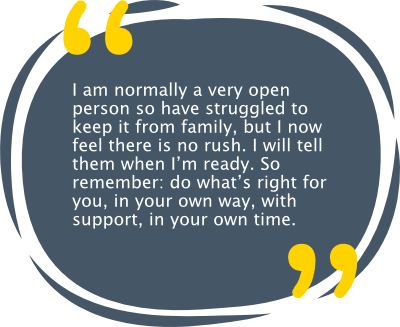
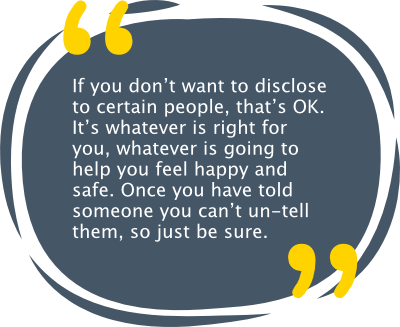
If you want to tell someone, make sure to tell someone you trust. You can never take a disclosure back and telling others means you have less control over how that information is shared. You should be careful about disclosing to people who might not respect your privacy.
Think about how they may react. Remember the emotions you felt when you found out and be prepared for others to have their own reactions. Think about whether you are confident that you can deal with their reaction. Disclosing your status can be a huge relief. Although some people will experience rejection, many people find that friends and family are extremely supportive. Be prepared for a variety of reactions: what’s the best you can hope for and worst you might have to deal with?
Think about how they may react. Remember the emotions you felt when you found out and be prepared for others to have their own reactions. Think about whether you are confident that you can deal with their reaction. Disclosing your status can be a huge relief. Although some people will experience rejection, many people find that friends and family are extremely supportive. Be prepared for a variety of reactions: what’s the best you can hope for and worst you might have to deal with?
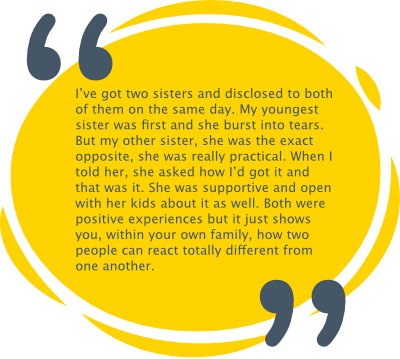
Get support. It may help to talk to support services, a peer support person, or a healthcare professional you trust, before disclosing to family, friends and partners.
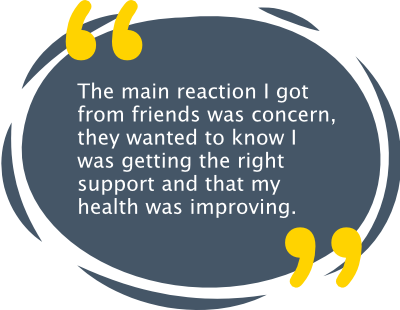
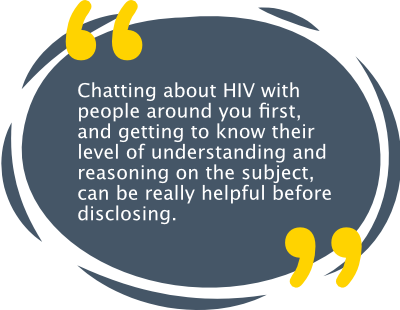
Make it clear that knowledge of your status is something you’re trusting them with, and that it’s confidential. Be clear whether it is okay for them to tell other people – you may want to tell them to ask your permission before they tell anyone else.
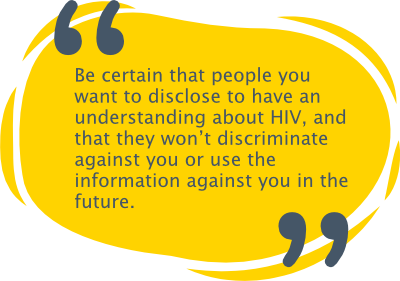
Be prepared for questions. If you are the first person they know who has HIV, they will be on a learning curve. Be prepared with answers to the most likely queries – they may have questions on the basic facts or worries about prevention and testing. Giving them written information about HIV that they can look at later could be helpful. Places where you can access information and support are listed at the end of this guide.
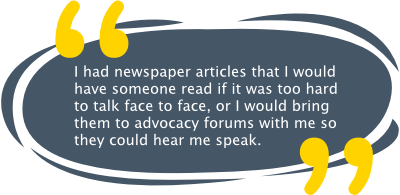

You should also consider which questions you’re comfortable answering. People may ask you how you got HIV and if you don’t want to share that information it could be helpful to have a reply ready in advance.
Get support. It may help to talk to support services, a peer support person, or a healthcare professional you trust, before disclosing to family, friends and partners. They can offer you support to tell people, help you clarify what you want to say and prepare you for any questions. They could also link you to support groups or other people who can help you in the disclosure process. Remember to make yourself a priority. Have a support person lined up to call afterwards or even bring the person with you for the discussion.
Get support. It may help to talk to support services, a peer support person, or a healthcare professional you trust, before disclosing to family, friends and partners. They can offer you support to tell people, help you clarify what you want to say and prepare you for any questions. They could also link you to support groups or other people who can help you in the disclosure process. Remember to make yourself a priority. Have a support person lined up to call afterwards or even bring the person with you for the discussion.
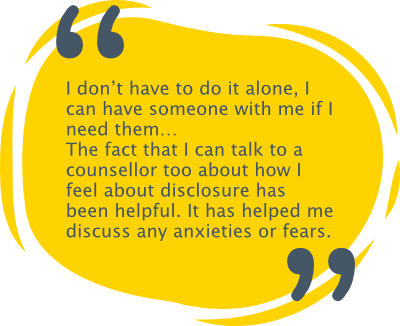
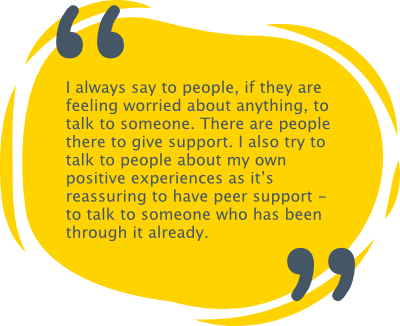
Human Rights Act 1993
In New Zealand it is illegal to discriminate against HIV+ people.
Sect 21(h)(vii) Prohibited grounds of discrimination “The presence in the body of organisms capable of causing illness.”
You cannot be sacked from employment or thrown out of accommodation. You cannot be refused medical, hospital or dental treatment. Shops, business, restaurants and service providers cannot refuse to serve you.
Sect 21(h)(vii) Prohibited grounds of discrimination “The presence in the body of organisms capable of causing illness.”
You cannot be sacked from employment or thrown out of accommodation. You cannot be refused medical, hospital or dental treatment. Shops, business, restaurants and service providers cannot refuse to serve you.
New Zealand law & potential criminal liability
The Crimes Act states...
People living with HIV “... are under a legal duty to take reasonable precautions against, (transmitting infection) and to use reasonable care to avoid such danger, and are criminally responsible for the consequence of omitting without lawful excuse in discharging that duty.”
People living with HIV can exercise their “duty of care” by ensuring good quality condoms are correctly used when they engage in sexual activity.
People living with HIV can exercise their “duty of care” by ensuring good quality condoms are correctly used when they engage in sexual activity.
In New Zealand there have been several court proceedings and convictions against people living with HIV who have NOT used condoms and NOT declared their HIV+ status before having sex.
People living with HIV DO NOT need to declare their HIV+ status when condoms are used. Nor do they need to declare their HIV status when oral sex is performed.
People living with HIV DO NOT need to declare their HIV+ status when condoms are used. Nor do they need to declare their HIV status when oral sex is performed.
Join Body Positive
By becoming a member you will be able to access all the services we offer, as well as support and updates to help you live better.
Newsletter
Want to be keep up with whats happening at Body Positive?
Subscribe to our newsletter below by submitting your e-mail address.
Subscribe to our newsletter below by submitting your e-mail address.

